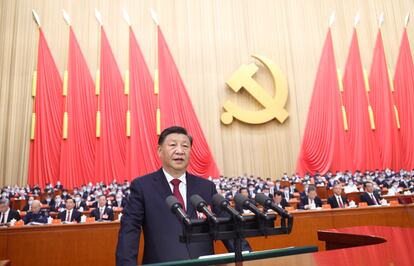China’s Xi Jinping warns against ‘interference by external forces’ in pursuit of reunification with Taiwan
Leader’s speech at opening of Communist Party summit, which is set to grant him a third term in power, did not deviate from past pledges, but it included a more aggressive reference to the US


During his speech this past Sunday to open the 20th National Congress of the Communist Party, Chinese President Xi Jinping assured his audience that, as he assumes his third term in office, he will pursue “peaceful reunification” with Taiwan, but also that Beijing will never agree to “renounce the use of armed force” as a means of achieving this. “Taiwan belongs to China,” he affirmed.
The speech, delivered in the Great Hall of the People – located at the edge of Beijing’s Tiananmen Square – lasted nearly two hours. It provided an overview of a wide array of topics, such as economic recovery from the pandemic, technological and military development, the health of the “world’s largest ruling Marxist party” and the modernization of Marxism “with Chinese characteristics.”
Xi, who is expected to be confirmed to a third term by the Congress later this week, stressed that, over the last five years of his second term, the issues China faced have been “extraordinary,” leaving the world with many changes and challenges.
“The world is once again at a historical crossroads,” Xi said, caused by “acts of hegemony, authoritarianism and bullying.” He denounced what he views as a “Cold War mentality” in global politics and offered China as an “independent and peaceful” power to counter this. He vowed to promote “the construction of a new type of international relations.”
The US government is clearly alarmed by Xi’s rhetoric. This past week, President Joe Biden’s administration released its 2022 National Security Strategy, which opines that the Asian giant is America’s “only competitor with the intent to reshape the international order and, increasingly, the power to do it.”
Xi pledged that by 2050, China will have become a " powerful, prosperous, democratic, civilized, harmonious and beautiful modern socialist country”
The tension between the two superpowers is embodied by the question of Taiwan. Nancy Pelosi, Speaker of the US House of Representatives, visited the island this past August. Beijing viewed this as a provocation, since the Chinese government considers Taiwan to be part of its territory. Following the visit, Xi ordered military exercises in the Taiwan Strait – the narrow portion of the South China Sea that separates the island nation from continental Asia.
In his recent speech, Xi cryptically referred to the United States, promising that he would adopt “all necessary measures… against the interference of external forces.” His words are not new, but they come at a critical time as he begins another five-year term in power.
Nearly 2,300 delegates came from all corners of China to attend Xi’s speech. It started at 10am local time, after a military band played the national anthem. The president spoke in a rhythmic and solemn voice, only interrupted occasionally by muted applause. However, when he spoke about Taiwan and his administration’s fight against corruption – one of his pet projects – his voice filled with emotion. The delegates responded by clapping more loudly.
Xi spoke from a lectern, with the 205 members of the Central Committee of the Chinese Communist Party seated at desks behind him. This body is renewed at the end of each national congress, with 25 members of the Politburo and seven members of the Standing Committee (including Xi) being selected.
Xi – who is both the President of China and General Secretary of the Communist Party – has been consolidating his power since he took office in 2013. He has managed to eliminate presidential term limits in the country’s constitution, while achieving absolute loyalty from the 96 million members of his party.
Xi proclaimed that, by 2035, China will have made a “substantial leap” in “economic-scientific-technological power.” By 2050, he vows that China will have become a " powerful, prosperous, democratic, civilized, harmonious and beautiful modern socialist country,” while leading in “international influence.”
He boasted that, during his decade in power, he increased China’s GDP from 54 trillion yuan ($7.3 trillion) to 114 trillion ($16.3 trillion). While acknowledging recent economic slowdowns – exacerbated by the pandemic, China’s “zero-Covid” lockdowns and a housing crisis – he noted that China has still consolidated itself as the second-biggest economy in the world, after the United States.
For those hoping that China’s leader would soften his Covid restrictions, they were likely disappointed by his speech. Xi was unapologetic about his strict lockdowns and massive testing protocols; he defended his commitment to “unhesitatingly persevere in real-time suppression of outbreaks.”
Tu suscripción se está usando en otro dispositivo
¿Quieres añadir otro usuario a tu suscripción?
Si continúas leyendo en este dispositivo, no se podrá leer en el otro.
FlechaTu suscripción se está usando en otro dispositivo y solo puedes acceder a EL PAÍS desde un dispositivo a la vez.
Si quieres compartir tu cuenta, cambia tu suscripción a la modalidad Premium, así podrás añadir otro usuario. Cada uno accederá con su propia cuenta de email, lo que os permitirá personalizar vuestra experiencia en EL PAÍS.
¿Tienes una suscripción de empresa? Accede aquí para contratar más cuentas.
En el caso de no saber quién está usando tu cuenta, te recomendamos cambiar tu contraseña aquí.
Si decides continuar compartiendo tu cuenta, este mensaje se mostrará en tu dispositivo y en el de la otra persona que está usando tu cuenta de forma indefinida, afectando a tu experiencia de lectura. Puedes consultar aquí los términos y condiciones de la suscripción digital.








































